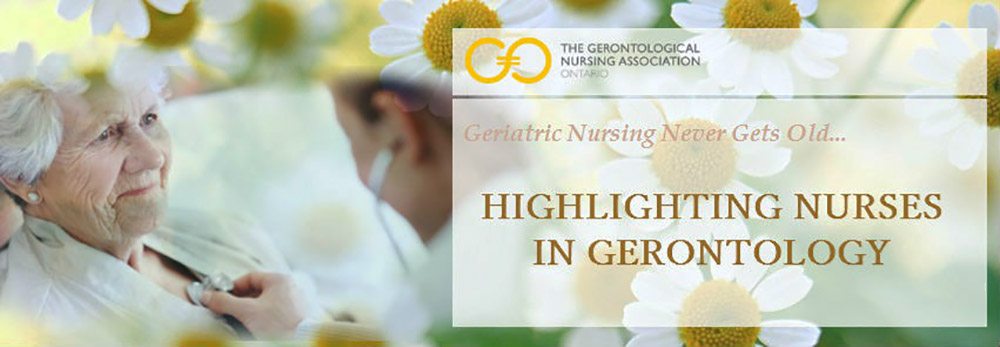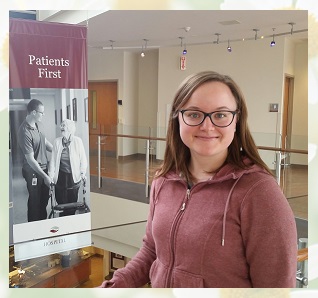Highlighting GNAO Nurses —

The Gerontological Nursing Association Ontario is pleased to present our new segment titled…
Geriatric Nursing Never Gets Old… Highlighting Nurses in Gerontology!
Gerontological nursing is a unique and diverse field of nursing that focuses on the care of older adults. Many geriatric nurses provide care to these older people in various different settings. Although we all have specialized knowledge and training to effectively educate, assess, and care for this population, the way in which we go about it is slightly different and unique. This new segment highlights nurses working in the field of gerontology and introduces you to their world! We invite you to read up on our nurses and to engage in discussion with them via the Student Discussion Forum, Social Media (facebook or twitter) or directly through the contact information that they provide. As we move into the month of March, please join us in highlighting and celebrating Sarah Gibbens!

Sarah Gibbens
Sarah Gibbens
Please describe to us your current role and what it is that you do in gerontology.
I currently work as a Geriatric Emergency Management Nurse (GEM RN) at Northumberland Hills Hospital in Cobourg. I provide clinical, gerontological, consultation in the Emergency Department (ED) as the primary component of my role, but concurrently work on several organizational projects as they fit with bettering the care of older adults and also on several community committees that focus on the needs of seniors. The clinical role consists of targeted gerontological assessments in order to quickly decipher what’s new and what’s not, with a strong focus on the identification of geriatric syndromes. Some examples of geriatric syndromes are delirium, depression, falls/mobility issues, caregiver stress, cognitive impairment, pain, and polypharmacy. Assessments include, but are not limited to: deciphering if delirium is present or not; investigating cause(s) of falls; looking at mobility and activities of daily living; and screening for medications deemed high risk. It very quickly provides a good picture of new versus chronic conditions. From this, the GEM can link seniors with community resources and support, or advocate for a hospital admission. I also work with seniors’ right in the ED in order to prevent any cognitive and functional decline from occurring in such a high speed, chaotic environment. This includes getting older adults up and walking – it is the number one way to prevent hospital admissions and decline in my books! Other initiatives are essential like: getting an older adult with dementia engaged in activities like music therapy right in the ED; calling in the support of family to bring in dentures, hearing aids, and glasses of the vision and hearing impaired; and encouraging food and fluid intake while waiting many hours for tests and results.
Why did you decide to pursue gerontological nursing?
I worked as a dietary aide at a retirement facility for a summer job during university, and quickly saw how such small interventions can make such amazingly positive impacts in people’s lives. Not knowing at the time, but I worked with one man in particular who had dementia and was non-verbal. He would only point or grunt until we could all understand his routine. One day I began to sing while cleaning up the dining room and his voice boomed out as he finished the chorus of Somewhere over the Rainbow. I will never forget the person I saw behind the dementia, the sound of his voice, and the smile on his face. I wanted to continue to pursue this passion with more depth in the nursing field. Once in the field I saw just how much specialty is required for gerontological nursing, and wanted to become as strong an advocate as I could so I completed a Master of Nursing from the University of Toronto. I strongly pursued the GEM RN role as it seemed to fit all my interests and offered me an opportunity to continue to grow throughout my career.
Many of us have been mentored or inspired by another nurse at some point in our nursing journey. Is there one person in particular who has helped you along the way in becoming a gerontological nurse?
There is a very special mentor in my life and has made a significant difference in my clinical practice and in my confidence in myself as an advocate for this vulnerable population. I met Maryanne Brown almost 4 years ago and have since made leaps and bounds as a gerontological nurse. Maryanne pushed me to take on challenging opportunities and supported me during some of the most difficult years as a new GEM RN. Maryanne Brown is an Advanced Practice Nurse Consultant who I am so lucky to have met and without her, I am uncertain where I would be in my career. I encourage anyone to reach out and develop mentorship relationships if possible. They are invaluable and, at times, career saving! I want to take this opportunity to thank Maryanne from the bottom of my heart for her guidance and support, and tell her that I will find success if I am able to mentor someone else in the future with even half the wisdom that she provided me.
What is one of the most fulfilling aspects of being a gerontological nurse?
The most fulfilling aspect of gerontology is that every single day, when I look into the eyes of an older adult, I am trusted to hear their life stories, their memories, their worries and fears, their secrets, and their hopes and dreams.
What is one thing you would want to share about gerontological nursing that most people might not otherwise know?
There is a massive community of nurses interested and passionate about gerontology out there! You are not alone!
Do you have any advice for nurses or students interested in pursuing gerontology as a specialty?
Never give up. You will hear things from others like, “you need to build your skills first on the medicine floors” or, “you don’t want to lose your skills”, and I have even heard, “so you don’t want to do real nursing?” Never give up — the older adults require your advocacy, your passion for change, and your expertise. Reach out to a mentor for support, and keep your head high during those times when others challenge you with comments rooted in stereotype.
If anyone is interested in connecting with you further, how can they reach you?
Please feel free to do so via email – I look forward to any connections that can be made!
If you are a nurse who is working in gerontology and would like to share your story on our page, email Annie
GNAO Newsletter
Find the link to the newsletter on the Resources page